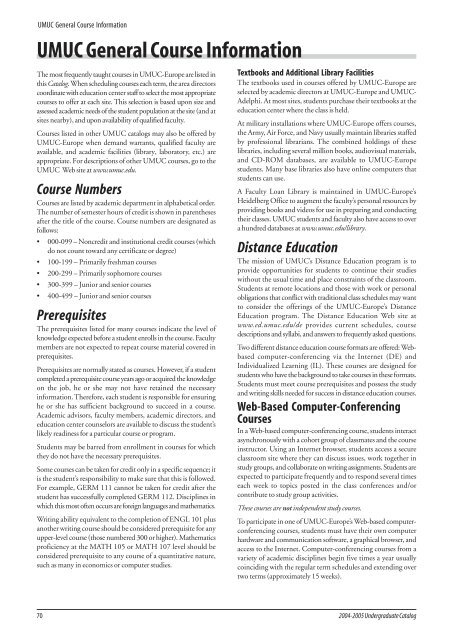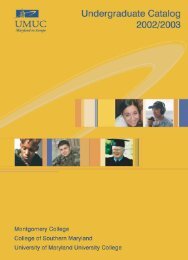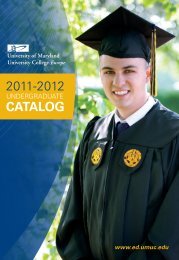Statements of Policy - UMUC Europe
Statements of Policy - UMUC Europe
Statements of Policy - UMUC Europe
You also want an ePaper? Increase the reach of your titles
YUMPU automatically turns print PDFs into web optimized ePapers that Google loves.
<strong>UMUC</strong> General Course Information<br />
<strong>UMUC</strong> General Course Information<br />
The most frequently taught courses in <strong>UMUC</strong>-<strong>Europe</strong> are listed in<br />
this Catalog. When scheduling courses each term, the area directors<br />
coordinate with education center staff to select the most appropriate<br />
courses to <strong>of</strong>fer at each site. This selection is based upon size and<br />
assessed academic needs <strong>of</strong> the student population at the site (and at<br />
sites nearby), and upon availability <strong>of</strong> qualified faculty.<br />
Courses listed in other <strong>UMUC</strong> catalogs may also be <strong>of</strong>fered by<br />
<strong>UMUC</strong>-<strong>Europe</strong> when demand warrants, qualified faculty are<br />
available, and academic facilities (library, laboratory, etc.) are<br />
appropriate. For descriptions <strong>of</strong> other <strong>UMUC</strong> courses, go to the<br />
<strong>UMUC</strong> Web site at www.umuc.edu.<br />
Course Numbers<br />
Courses are listed by academic department in alphabetical order.<br />
The number <strong>of</strong> semester hours <strong>of</strong> credit is shown in parentheses<br />
after the title <strong>of</strong> the course. Course numbers are designated as<br />
follows:<br />
• 000-099 – Noncredit and institutional credit courses (which<br />
do not count toward any certificate or degree)<br />
• 100-199 – Primarily freshman courses<br />
• 200-299 – Primarily sophomore courses<br />
• 300-399 – Junior and senior courses<br />
• 400-499 – Junior and senior courses<br />
Prerequisites<br />
The prerequisites listed for many courses indicate the level <strong>of</strong><br />
knowledge expected before a student enrolls in the course. Faculty<br />
members are not expected to repeat course material covered in<br />
prerequisites.<br />
Prerequisites are normally stated as courses. However, if a student<br />
completed a prerequisite course years ago or acquired the knowledge<br />
on the job, he or she may not have retained the necessary<br />
information. Therefore, each student is responsible for ensuring<br />
he or she has sufficient background to succeed in a course.<br />
Academic advisors, faculty members, academic directors, and<br />
education center counselors are available to discuss the student’s<br />
likely readiness for a particular course or program.<br />
Students may be barred from enrollment in courses for which<br />
they do not have the necessary prerequisites.<br />
Some courses can be taken for credit only in a specific sequence; it<br />
is the student’s responsibility to make sure that this is followed.<br />
For example, GERM 111 cannot be taken for credit after the<br />
student has successfully completed GERM 112. Disciplines in<br />
which this most <strong>of</strong>ten occurs are foreign languages and mathematics.<br />
Writing ability equivalent to the completion <strong>of</strong> ENGL 101 plus<br />
another writing course should be considered prerequisite for any<br />
upper-level course (those numbered 300 or higher). Mathematics<br />
pr<strong>of</strong>iciency at the MATH 105 or MATH 107 level should be<br />
considered prerequisite to any course <strong>of</strong> a quantitative nature,<br />
such as many in economics or computer studies.<br />
70<br />
Textbooks and Additional Library Facilities<br />
The textbooks used in courses <strong>of</strong>fered by <strong>UMUC</strong>-<strong>Europe</strong> are<br />
selected by academic directors at <strong>UMUC</strong>-<strong>Europe</strong> and <strong>UMUC</strong>-<br />
Adelphi. At most sites, students purchase their textbooks at the<br />
education center where the class is held.<br />
At military installations where <strong>UMUC</strong>-<strong>Europe</strong> <strong>of</strong>fers courses,<br />
the Army, Air Force, and Navy usually maintain libraries staffed<br />
by pr<strong>of</strong>essional librarians. The combined holdings <strong>of</strong> these<br />
libraries, including several million books, audiovisual materials,<br />
and CD-ROM databases, are available to <strong>UMUC</strong>-<strong>Europe</strong><br />
students. Many base libraries also have online computers that<br />
students can use.<br />
A Faculty Loan Library is maintained in <strong>UMUC</strong>-<strong>Europe</strong>’s<br />
Heidelberg Office to augment the faculty’s personal resources by<br />
providing books and videos for use in preparing and conducting<br />
their classes. <strong>UMUC</strong> students and faculty also have access to over<br />
a hundred databases at www.umuc.edu/library.<br />
Distance Education<br />
The mission <strong>of</strong> <strong>UMUC</strong>’s Distance Education program is to<br />
provide opportunities for students to continue their studies<br />
without the usual time and place constraints <strong>of</strong> the classroom.<br />
Students at remote locations and those with work or personal<br />
obligations that conflict with traditional class schedules may want<br />
to consider the <strong>of</strong>ferings <strong>of</strong> the <strong>UMUC</strong>-<strong>Europe</strong>’s Distance<br />
Education program. The Distance Education Web site at<br />
www.ed.umuc.edu/de provides current schedules, course<br />
descriptions and syllabi, and answers to frequently asked questions.<br />
Two different distance education course formats are <strong>of</strong>fered: Webbased<br />
computer-conferencing via the Internet (DE) and<br />
Individualized Learning (IL). These courses are designed for<br />
students who have the background to take courses in these formats.<br />
Students must meet course prerequisites and possess the study<br />
and writing skills needed for success in distance education courses.<br />
Web-Based Computer-Conferencing<br />
Courses<br />
In a Web-based computer-conferencing course, students interact<br />
asynchronously with a cohort group <strong>of</strong> classmates and the course<br />
instructor. Using an Internet browser, students access a secure<br />
classroom site where they can discuss issues, work together in<br />
study groups, and collaborate on writing assignments. Students are<br />
expected to participate frequently and to respond several times<br />
each week to topics posted in the class conferences and/or<br />
contribute to study group activities.<br />
These courses are not independent study courses.<br />
To participate in one <strong>of</strong> <strong>UMUC</strong>-<strong>Europe</strong>’s Web-based computerconferencing<br />
courses, students must have their own computer<br />
hardware and communication s<strong>of</strong>tware, a graphical browser, and<br />
access to the Internet. Computer-conferencing courses from a<br />
variety <strong>of</strong> academic disciplines begin five times a year usually<br />
coinciding with the regular term schedules and extending over<br />
two terms (approximately 15 weeks).<br />
2004-2005 Undergraduate Catalog






